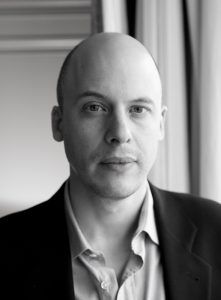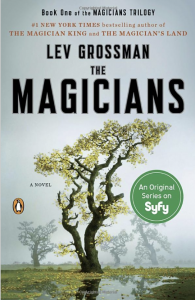 “None of this is new,” said Grossman, current holder of Fordham’s Mary Higgins Clark Chair in Creative Writing. “Shakespeare trafficked in all manner of ghosts, so did Dante and Milton, they were all fantasists dealing in emotional reality.”
“None of this is new,” said Grossman, current holder of Fordham’s Mary Higgins Clark Chair in Creative Writing. “Shakespeare trafficked in all manner of ghosts, so did Dante and Milton, they were all fantasists dealing in emotional reality.”
The book is the cornerstone for Fordham College at Lincoln Center’s Year of Magic, a series of events for first-year students that look at magic through a variety of academic disciplines. The novel has also inspired an ongoing SyFy network television series, which examines the practice of magic in the real world.
Grossman said that the creators of the television show—which examines the practice of magic in the real world—often consult with him on the script, but they have indeed “made it their own.” He said that many of the book’s characters and settings remain the same, though the storyline often veers in directions distinct from the book.
“Stories on screen are shaped very different from books, they have looping plots, and those loops have to fit together for the season and to make seasonal arcs,” he said.
He said that this is a great age for storytelling on television, particularly for shows adapted from books, such as The Handmaid’s Tale, based on Margaret Atwood’s dystopian novel. Grossman called those shows “rich and complex,” but he emphasized that” books do things differently.” “In TV, the plot surfaces, but in novels you can move back and forward in time and space,” he said. “There’s no one more powerful than a narrator of a novel; it’s absolutely the most magical thing there is.”
“In TV, the plot surfaces, but in novels you can move back and forward in time and space,” he said. “There’s no one more powerful than a narrator of a novel; it’s absolutely the most magical thing there is.”
On the subject of magic, he said that he was, like most young people, attracted to fantasy from an early age.
“It’s really the lingua franca for kids, but I didn’t write about until I was in my mid-thirties,” he said. “By the mid-aughts, it had become so central to our culture, with Lord of the Rings, Twilight, and Harry Potter.”
He said that he read fantasy “compulsively.” In his book, he describes characters who do magic compulsively, even addictively—like a drug. They live secret lives in shambled homes akin to crack houses. But that’s not to say fantasy is about escapism, he said. It’s about facing the truth.
“Fantasy is a way at getting at real issues,” he said.
In his Mary Higgins Clark Chair in Creative Writing Lecture on Oct. 15, Grossman said he’ll explore a variety of themes, from magic to the professional lives of writers and even changes that have occurred since he wrote the book in 2009. Several students have already commented on the lack of diversity in the novel and issues related to gender portrayal.
“I hope students will feel comfortable bringing that up personally at the Q&A at the lecture,” he said.
Because everyone seems to have an option on writing these days, literary critics have had to find a new role, Grossman said, particularly at time when Amazon reviews usurp traditional book criticism.
“Literary criticism has become about how to read and less about thumbs up or thumbs down,” he said. “Today’s critics look at ways of analyzing texts and ways of being aware when reading text, which makes reading more exciting.”
He said that the times also demand different entrées into books. At the lecture, he’ll also discuss particular tools in writing, such as how to write a catchy opening.
“When you’re writing nowadays, you have to remember that people buy based on an excerpt or from the first page,” he said. “We don’t have the luxury of a slow burn, it helps to hook and grab. I like to focus on these little moments.”
He said that the title of his lecture, “I Did It Wrong,” hints at the hard-knocks path of getting published, adding that he had no meaningful success until he was 40. Preparing for the lecture made him think about how long it took for him to feel like he was having any success as a creative person.
“There isn’t any right way to do this and everybody thinks they do it wrong, so I want them to understand what’s ahead,” he said. “My lecture will be much more personal; I want to talk about the experience of trying to be a creative person in the world and the kinds of compromises and challenges and you have to deal with.”
Writing can be a very lonely business, he said, and rejection doesn’t help. The reality is that the feeling of personal rejection is part of the business.
“The world will try to convince you that you are not a creative person and the trick is to make sure it doesn’t succeed.”

